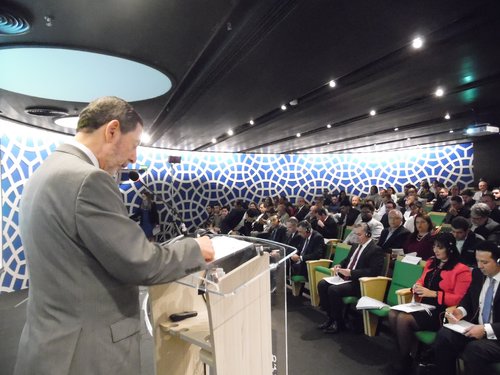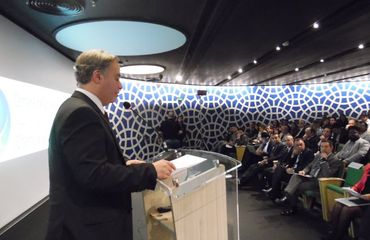<
São Paulo – Brazil and Egypt should work to speed up the revocation of tariffs of products detailed in the free trade agreement that the Arab country signed with Mercosur. The request was expressed by participants of a forum that took place at the Arab Brazilian Chamber of Commerce in São Paulo in Friday (8) morning, with the presence of representatives from the Arab country’s trade promotion agencies and Brazilian entrepreneurs.
The Egyptian delegation that is visiting Brazil will go to Buenos Aires to a meeting with Mercosur representatives this Sunday (10), where the topic of the revocation of tariffs will be discussed. The mission is led by the head of the Egyptian Commercial Service (ECS), Ahmed Anter, who is also the first under-secretary of Egypt’s Ministry of Industry and Trade.
The vice-president of Foreign Affairs of the Arab Chamber, Osmar Chohfi, said that the organization will work to speed up these tariff revocations. From the products that will have their tariffs revoked for trade between Mercosur and Egypt by the agreement, which are 9,800, only 52% will be immediate, with the others going through a reduction of tariffs spread out in ten years.
Mentioning Egyptian products that will be benefited by the agreement, such as fertilizers, chemicals and textiles, the CEO of the Export Development Authority of Egypt (EDA), Sherine El Shorbag, said that she expects, referring to the deadlines for the revocations, that some of the clauses of the agreement with Mercosur can be negotiated. “To some of these areas, the agreement details free trade in ten years,” she said to the forum’s audience.
<
Fertilizers, the most exported product by Egypt to Brazil, will have its tariff revoked immediately, according to information presented at the forum by the Arab Chamber’s executive of International Relations, Fernanda Baltazar. Of all the items included in the agreement, some will have their tariffs revoked in four years, some in eight years, some in ten years, and others have yet to have these dates set.
Among furniture, in 5% of the products Egypt will gain tariff exemption in four years, in 22% in eight years, in 63% in ten years and in 10% yet to be determined. In the case of textiles and apparel products, in 7% there will be an immediate revocation, in 15% in four years, in 42% in eight years and in 36% in ten years.
According to information given to ANBA by Renato de Alencar Lima, from Brazil’s Ministry of Foreign Affairs (Itamaraty) regional office in São Paulo, it’s possible to speed up the tariff revocations in technical meetings between the parts after agreements are signed. Lima was one of the speakers at the forum in behalf of Itamaraty.
Egypt and Brazil already have a significant trade, but it’s, mainly, the exports of Brazilian products. Sales from Brazil to the Egyptian market totaled over USD 2 billion between January and October, while sales from Egypt to Brazil totaled USD 140 million. There was an increase in sales on both sides. Brazil supplied to Egyptians mainly sugar, beef, maize, poultry and ore, while the Arab country send to Brazil fertilizers, naphtha and olive.
<
“Egypt is a very reliable partner, because within the context of the negative repercussion caused by Carne Fraca, they (the Egyptians) expressed trust and continued to buy. We are very grateful to Egypt for this display of trust,” said Chohfi about the reopening of the Egyptian market to Brazilian beef in such a short time after the clarifications of the allegations by the Federal Police on the sales of beef without inspection, in an operation called Carne Fraca.
The Arab Chamber’s vice-president of International Affairs said that Egypt is Brazil’s third largest trade partner between the Arab countries. Egypt’s ambassador in Brazil, Alaaeldin Roushdy, who was also a speaker in the forum, mentioned the importance of both countries in their regions, Brazil with a market of 200 million people and Egypt with a market of 100 million people. “They are the largest in their regions and the cooperation can be even greater than what currently is,” he said.
Representatives from the Egyptian delegation presented the country’s potential. Anter talked about Egypt’s new economy phase, with the implementation, by the government, of successful programs that helped the country gain competitivity. He mentioned the decline of the unemployment rate, the increase of international reserves, the fluctuation of the Egyptian pound against the dollar, the agreement with the International Monetary Fund, plus the reduction of the amount of time taken for the issuance of licenses for local production of finished products and the new investments bill.
<
Shorbag also talked about the attractiveness of her country as a destination for investments, due to new laws for the sector, the size of the industrial complex, the low cost for production, the bilateral agreements, among other features. She said that the country improved its ability to deal with international markets. According to Shorbag, Egypt always had as its main markets Europe and the United States, but that it will now search for new ones.
Other speakers at the forum were the director of Investe São Paulo, Sérgio Costa, the economist of the Department of Funding and International Institutional Relations of the Brazilian Development Bank (BNDES), Denise Andrade Rodrigues, and the deputy head of the Americas Department of ECS, Yasser Qourany.
At the end of the meeting, the Egyptians and the representatives of the Arab Chamber answered a series of questions from the business owners at the audience about trade between Brazil and Egypt. Also attending the event were representatives of other organizations, such as the Brazilian Beef Exporters Association (ABIEC), and the leadership of the Arab Chamber, such as director Mohamad Orra Mourad.
*Translated by Sérgio Kakitani







